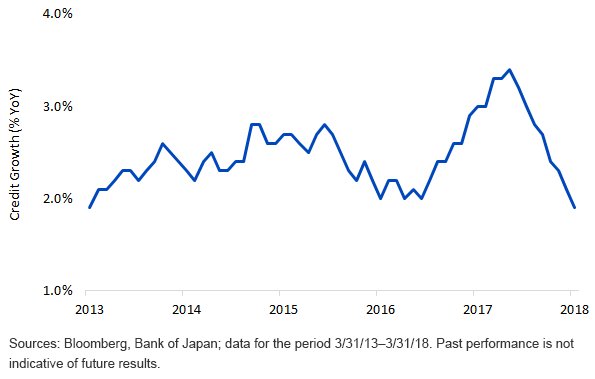More BOJ Board Dissent to Raise the BOJ’s Credibility—Desyncing from the Fed Cycle


This week will bring the first Bank of Japan (BOJ) policy board meeting with the newly appointed deputy governors. In our view, it won’t be “business as usual.” There’s a good chance we’ll get a shift in the board’s decision-making balance toward a more credible asymmetric bias to ease. Yes, the BOJ is more likely to go against the Federal Reserve (Fed) than with it.
Specifically, we expect that the number of board members calling for added stimulus will rise from one to two, with new Deputy Governor Masazumi Wakatabe expected to live up to his ultra-reflation reputation, which, after all, got him elected to the board in the first place. He would join board member Goushi Kataoka, who has been the steadfast, lone voice calling for added ease since joining the board in late July 2017. (There are nine voting board members.)
In fact, failure of the new deputy to live up to his credentials and reputation would come as a negative surprise. For any monetarist (like Wakatabe), the drop-off in bank credit growth from peak growth rates of 3.3% last summer to barely 2% in recent months must be a red-flag, a possible leading indicator for a cyclical downturn (see chart). While overall activity data has been less negative than the money and credit statistics, the roll-down in the domestic Tankan business conditions, the residential housing recession and the recently highly volatile industrial production reports suggest Japan’s upside momentum has stalled and downside risks have risen.
Importantly, Governor Haruhiko Kuroda himself left no ambiguity in Sunday’s warning at the end of the G20 meetings in Washington: “There is still a long way to achieve the 2% inflation target … but the risks are skewed to the downside.” (See Governor Kuroda on CNBC.)
In global markets, the BOJ has been suffering a growing credibility problem. Few believe that Japan can afford to not follow the U.S. lead on interest rates. After a decade of “synchronized” monetary policy, why should the BOJ be able to “decouple” from the Fed? In our view, Governor Kuroda has already given the answer—Japan will not stop before actually meeting the inflation target.
On Friday, April 27, when Governor Kuroda concludes the first BOJ board meeting with his new deputy governors, we expect no change in actual policy targets and operational tools but do foresee a clear sign that now two, not just one, of the nine board members are calling for added ammunition to credibly hit the 2% inflation target. If so, confidence in the BOJ’s decoupling from the Fed-rate cycle should grow, which in turn should push down the yen and pull up Japanese equities.
Japan Private Bank Credit Growth, Year-over-Year



